Like I said in Cannes, David Mackenzie‘s Hell or High Water is a meditative, social malaise, heartache-in-the-heartland movie disguised as a film about cops and bank robbers. All those cash-poor hinterland bubbas with their backs against the wall are feeling the pain, you bet. But they’re too damn dumb and blinded by the myths of their cultural gulag to understand that Donald Trump is not their friend and never will be, and that their only hope is to vote for their actual economic interests (i.e., become a Berniebot) and not in response to bogus cultural issues that the right uses to keep them in line.
Serenade
When I first saw an image of Bryce Hayashi (trumpet) and Mickle Miller (flugel) playing the Star Wars theme in front of John Williams’ Westwood home, I said to myself “this is pathetic…these guys need to develop lives.” Then I watched the video and changed my mind. Because they sound like decent, disciplined musicians. I say this as one who struggled with the trumpet when I was 10, 11 and 12 years old. I know how hard it is just to not embarrass yourself. These guys, I have to admit, are above average. Hats off.
Possible Best Picture Showdown: Fences vs. The Birth of a Nation
Paramount Pictures has given a prime award-season slot to Denzel Washington‘s Fences, an adaptation of the renowned August Wilson play which only wrapped a month ago. The film will have a limited New York and L.A. break on 12.16 followed by a wide release on 12.25.
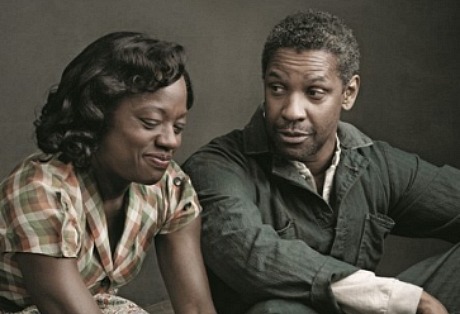
If you’re an Academy or SAG/PGA/DGA guild member looking to demonstrate to your colleagues or yourself that you’re not an Oscars-So-Whitey type, I can tell you right now you’re almost certainly going to nominate Fences along with The Birth of a Nation for Best Picture. Once that’s done it’ll be a mano e mano between these two. Within their realm, I mean.
I’m not saying either is going to win, lose or anything in between or that tokenism is going to be a greater factor than quality, but the odds strongly favor their inclusion as Best Picture contenders. 2016 is going to be the Year of the Great Oscars-So-White Makeup Gesture. Tell me I’m wrong.
Stephen Sondheim’s Assassins
If social media and YouTube had somehow been around in late ’63, Lee Harvey Oswald would have definitely recorded a series of philosophical manifestos prior to that fateful day in Dallas. He was an impassioned Marxist, a malcontent, a failure who would have revelled in the attention. The whole gang — Clay Shaw, Guy Banister, David Ferrie, the three tramps — probably would have made videos. Think of it.
Terrific — Another Emily Blunt Performance That Will Allow Me To Understand 60% to 70% Of Her Dialogue, If That
For some curious reason I’m more interested in seeing Fifty Shades of Gone Girl (Universal, 10.7) than a lot of other fall films. I know what it is — a sexually titillating adaptation of an airport best-seller aimed at women — and I want to dive in all the same. Even though Emily Blunt‘s character, Rachel Watson, starts out as a rummy. Mainly because I like well-constructed policiers. And yet Blunt’s submission to Rachel’s boozy despair has apparently led to a tendency I’ve come to dread with certain actresses — going for the feeling without a lot of diction, which results in a kind of actressy vocal fry. I understood maybe 60% or 70% of Blunt’s line readings in Sicario (she was playing a dull character so it didn’t matter all that much), but this looks like another performance that I won’t fully get until I can watch it with a subtitle option. (And don’t tell me it’s my hearing — I watched this trailer three times with my Bowers & Wilkins earphones on two computers.)
Yes, I agree — this new trailer is too much like the previous one. Yes, it has some new footage during the second half but it’s too similar.
“A Living Black Hole”
Excerpts from Jane Mayer‘s New Yorker profile of Tony Schwartz, who in the process of ghost-writing “The Art of the Deal” (1987) extensively hung out with Donald Trump and got to know him quite well. Schwartz is guilt-ridden over having sold the Trump myth to the public (“I put lipstick on a pig“) and is obviously looking to atone.
Mayer began chatting with Schwartz last month. The piece is fascinating, seemingly thorough, well-written. Definitely worth a full read.
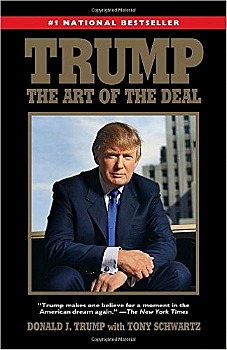
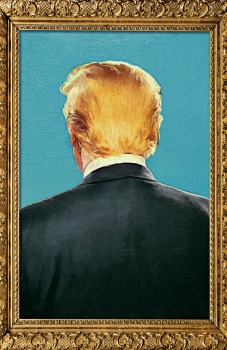
New Yorker illustration by Javier Jaen.
Excerpt #1: “When Schwartz began writing ‘The Art of the Deal,’ he realized that he needed to put an acceptable face on Trump’s loose relationship with the truth. So he concocted an artful euphemism. Writing in Trump’s voice, he explained to the reader, ‘I play to people’s fantasies…people want to believe that something is the biggest and the greatest and the most spectacular. I call it truthful hyperbole. It’s an innocent form of exaggeration — and it’s a very effective form of promotion.”
“Schwartz now disavows the passage. ‘Deceit,’ he told me, ‘is never innocent.’ He added, ‘Truthful hyperbole is a contradiction in terms. It’s a way of saying, it’s a lie but who cares?’ Trump, he said, loved the phrase.
The Smug Brothers
It is written in the Hollywood playbook that the personalities and speaking styles of action-film heroes have to be wry, cocky, self-amused. So completely confident about their badassery that nothing rattles them. No edge, no anxiety. Pretty much every threat is an opportunity for casual dispatch, gun-twirling and deadpan one-liners. We got this. If it gets any easier we could almost be bored.
Yes, this was the initial attitude of Yul Brynner, Steve McQueen, James Coburn, Charles Bronson and the others in John Sturges‘ The Magnificent Seven. But as that 1960 film wore on Sturges and the cast added darker layers: despair, guilt, bitterness, regret, fatalism.
Do the seven hotshots in Antoine Fuqua’s remake (Columbia/MGM, 9.23) develop in a similar way? Possibly, but you’d never know it from this trailer, which looks to me like more of the usual bullshit. Do you know why portions of this trailer suggest a videogame K-Mart version of Akira Kurosawa’s 1954 original? I’ll tell you why. Like every other action director, Fuqua is looking to appeal to the megaplex dumbshits but more importantly to the Chinese.
Shorter Nothingburger
A 106-minute cut of Jean-Pierre and Luc Dardennes‘ The Unknown Girl (as opposed to the 113-minute version that played in Cannes last May) will open in France on 10.12.16. Sundance Selects has the U.S. distrib rights, but will apparently delay the domestic opening until next year. If they felt any passion about this thing they would attach English subtitles to this Belgian-made trailer. Alas, non.
From my 5.18.16 Cannes review (“Doctor Detective”): “Whatever the story or thematic import, it was nearly a foregone conclusion that Jean-Pierre and Luc Dardennes‘ The Unknown Girl would be a moral tale that would (a) underwhelm, (b) radiate integrity and (c) be almost entirely composed of medium shots of people talking. Plain-spoken, unforced, refined, unpretentious. The Dardennes are nothing if not consistent.
“And if you’re smart, you’ll just sit there and take it. You have to slurp the soup and at least respect the ingredients. During this festival, I mean. As I wrote two years ago, the only negative thing Cannes critics are allowed to say about a Dardennes film is that it’s ‘minor.’
Viggo Mortensen’s Day of Reckoning
From Sasha Stone’s letter to Viggo Mortensen over his continuing, never-say-die support for Bernie Sanders: “It’s 2016 and we know the election could be close once again. We know that if Jill Stein earns 7% of the vote that could easily tip the election in Trump’s favor. We know that when that happens, Paul Ryan will essentially be President as Trump will become an hysterical puppet. We know, beyond any doubt, that they will put an extreme conservative back on the Supreme Court to replace Scalia. We know that they will try to overturn Obamacare, the rights of gay couples to get married in every state, a woman’s right to do with her body what she chooses. We know Trump’s first order of business will be to ‘declare war’ with ISIS and that will mean terrible terrible things for our country — and it will not stop ISIS anyway because no war can stop every madman in every truck. We know all of these things.
“How can you, in good conscience, believe that being true to your own whim is more important than protecting so many others will be put in such grave danger? How can the Viggo I thought I knew and admired be that selfish?”

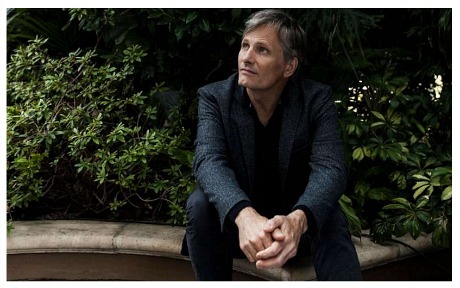
Say Your Prayers, Dirtbag
When I saw this photo on Facebook this morning, my second thought was “good…a cartoon character about to be shot through the head by Jason Bourne.” Then I thought of all the wonderful, starry-eyed kids out there who love the Ice Age characters and would be upset by this image, and certainly by this notion. I’m sorry for sharing this thought just now. I want only to think gentle, positive things about everyone and everything. Thank God for family-friendly animated features and all the money they make for the corporations who fund them.

Taken last night at the corner of Hollywood Blvd. and Highland Ave.
She Drives Me Crazy (i.e., Always Be Nice To Waiters)
Wives are always giving their husbands shit about something. You’re insensitive, you always wait too long to take out the garbage, you’re too randy, you’re too work-obsessed, you’re not randy enough, you could be a better provider, you don’t spend enough time with the kids, you lack sensitivity, you’re flabby. But wait until you hear the complaints in The Infiltrator, an ’80s cocaine-trade thriller about a real-life customs agent Robert Mazur (Bryan Cranston) who infiltrated the ranks of Pablo Escobar associates by pretending to be a flashy money launderer. They’re lulus.
They can be summed up as (a) “You put too much gusto into your impersonations when drug dealers are around” and (b) “The agent who’s pretending to be your wife in the field is too hot, and that’s entirely your fault.”
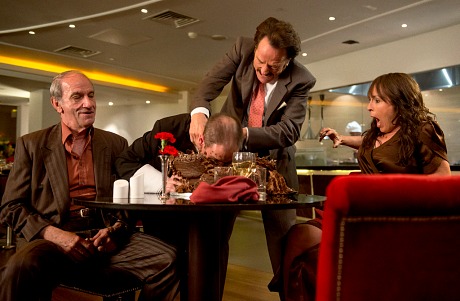
The already famous waiter-brutalizing scene in The Infiltrator — (l. to r.) Pablo Escobar associate, waiter getting head pushed into birthday cake, Robert Mazur (Bryan Cranston), Mazur’s rock-stupid wife Evelyn (Juliet Aubrey).
The gripes are on the idiotic side, but that’s…I was about to say irrational complaints are to be expected in any marriage but let’s be fair and balanced. And yet the fact is that Cranston absorbs some highly negative criticism from Juliet Aubrey (as Mazur’s wife Evelyn) — late in the second act, early in the third — that is forehead-slapping dumb.
93% of the film is about Cranston’s Mazur pretending to be slippery financier Bob Musella. If Mazur’s performance isn’t note-perfect the drug barons will smell a rat and kill him. Surely he’s told his wife this basic fact, and surely she understands that if he runs into one of these guys unexpectedly, he has to instantly and convincingly become “Bob Musella.” Obviously.
And yet when Mazur and his wife are out celebrating their anniversary at a nice restaurant, one of the Escobar guys strolls over and says “hey!”, and so Mazur, naturally, goes right into his act. And soon after he angrily chews out a waiter for serving a wedding anniversary cake (which in fact he had ordered) and not a birthday cake. Then he grabs the waiter and shoves his head into the cake. If the Escobar guy had suspected Mazur/Musella had, in fact, ordered an anniversary cake, the jig would be totally up.
“Truthful Hyperbole” — Trump’s Own Term Will Live in Infamy
“As [Donald] Trump prepares to claim the Republican nomination for president this week, he and his supporters are sure to laud his main calling card — his long, operatic record as a swaggering business tycoon. And without question, there will be successes aplenty to highlight, from his gleaming golden high-rises to his well-regarded golf resorts, hit TV shows and best-selling books.
“But a survey of Mr. Trump’s four decades of wheeling and dealing also reveals an equally operatic record of dissembling and deception, some of it unabashedly confirmed by Mr. Trump himself, who nearly 30 years ago first extolled the business advantages of ‘truthful hyperbole.’ Indeed, based on the mountain of court records churned out over the span of Mr. Trump’s career, it is hard to find a project he touched that did not produce allegations of broken promises, blatant lies or outright fraud.” — paragraphs #3 and #4 from David Barstow’s 7.16 N.Y. Times piece, “Donald Trump’s Deals Rely on Being Creative With the Truth.”

